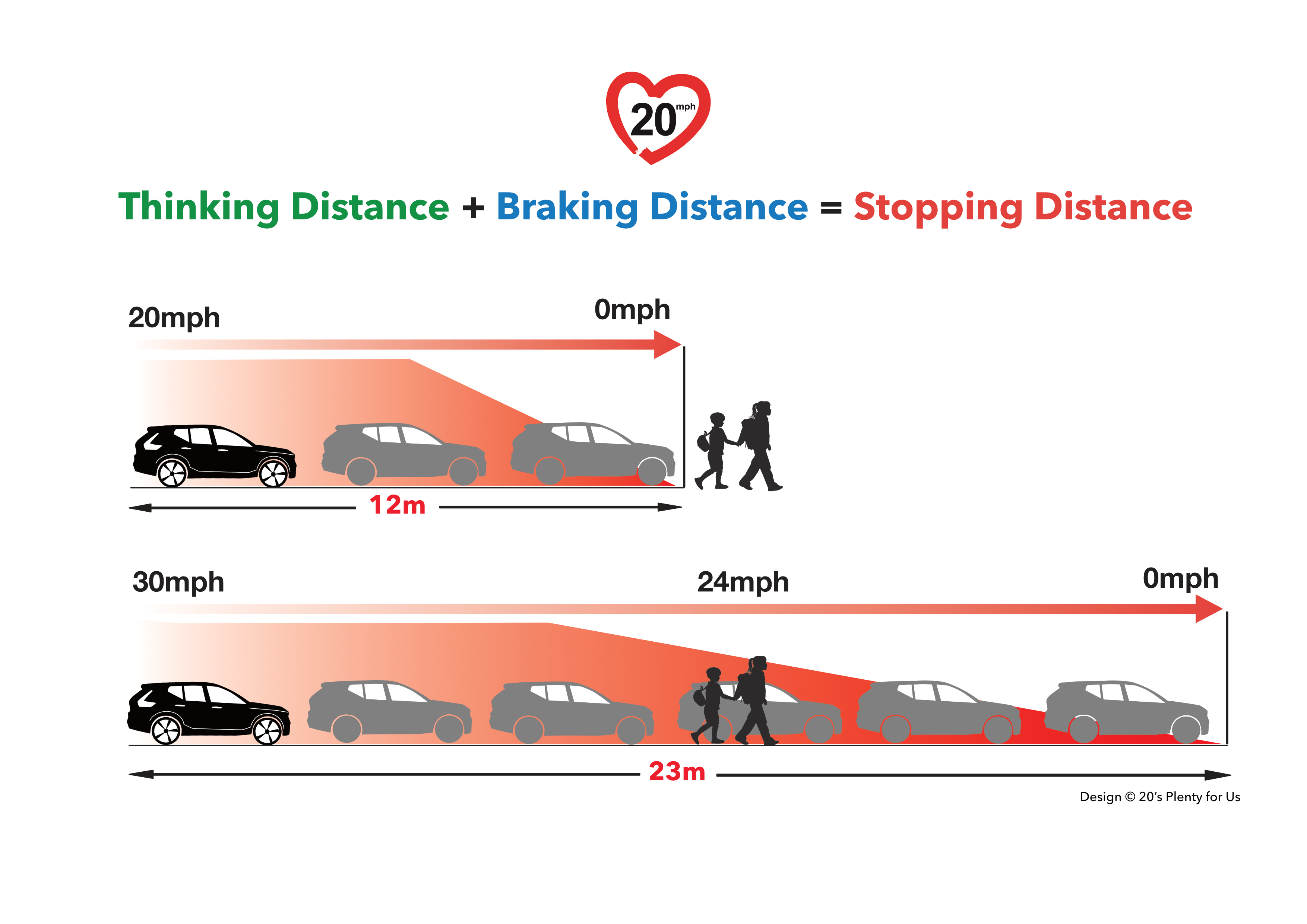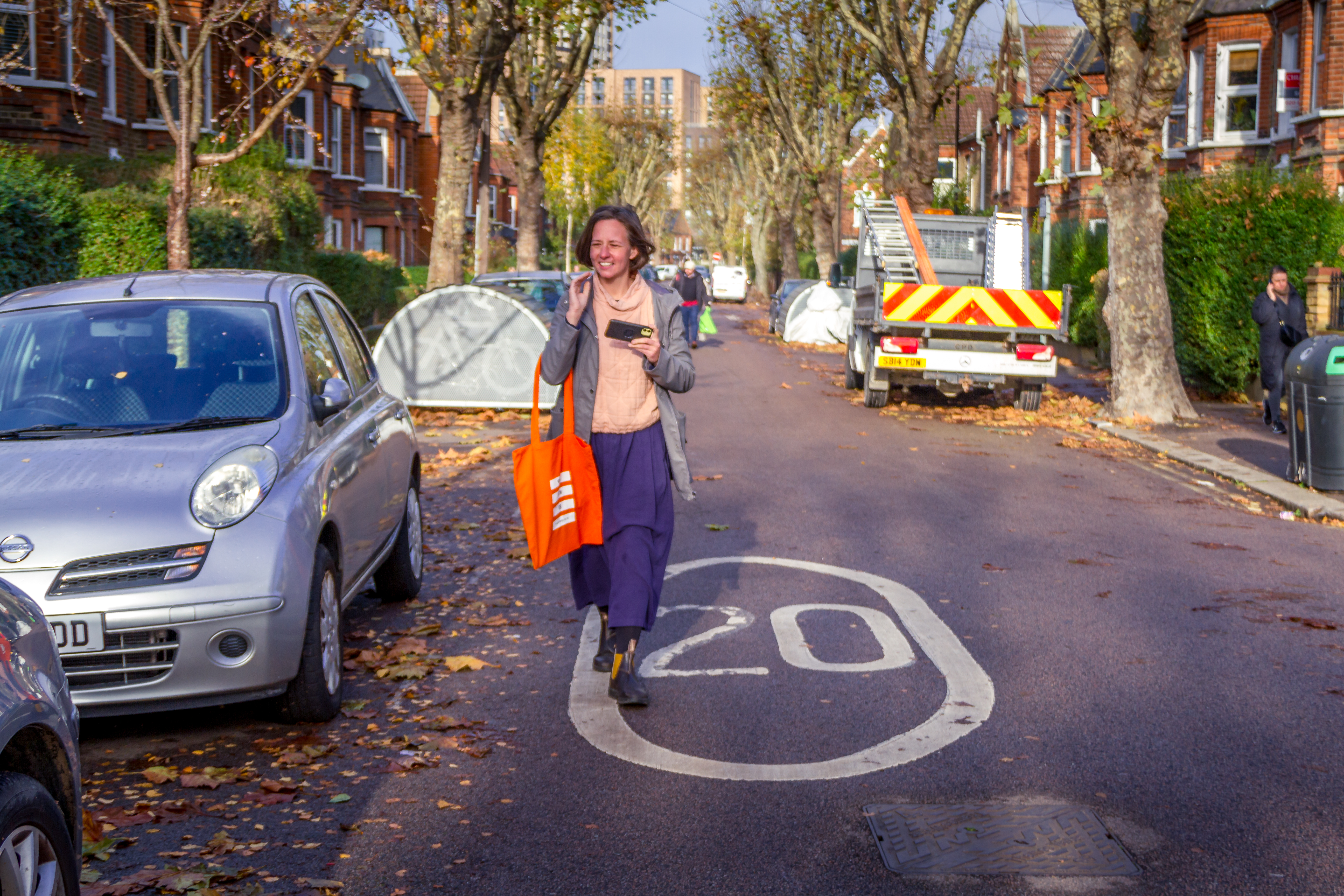20mph
What we say
Our cities, towns and villages need more 20mph speed limits to create safer streets and more vibrant communities where people live, work, shop or play. To make progress towards zero road deaths, the presumption should be towards lower national speed limits. Roads should be assessed for their safety at different speeds and any necessary changes made before any exceptions are allowed.
“Built up areas should have a default 20mph speed limit which can be ‘excepted up’ wherever the needs of any vulnerable road users are fully considered.” 20sPlenty
A car travelling at 30mph needs almost twice as much stopping distance (23m) as a car travelling at 20mph (12m). 20mph gives everyone more space and time to avoid incidents turning into casualties or fatalities.

What we want
We are calling for area-wide default 20mph speed limits where people live, work, shop and play, including on residential main roads and high streets.
Wales has already introduced a national default 20mph speed limit for urban and village streets. In 2022, Senedd Members voted in favour of introducing 20mph limits on residential roads across Wales, making it the first nation in the world to do so. The landmark legislation came into effect 17 September 2023.
In April 2024, the Senedd Transport Minister confirmed a ‘targeted approach’ to 20mph was to be taken across Wales, working closely with local authorities and various stakeholders to make this policy work for the people of Wales.
The Scottish Government is committed to local authorities introducing 20mph as an urban / village norm by 2025. In England, 62 out of 153 local authorities have adopted a policy similar to Scotland.
20mph speed limits must become a national standard in our cities, towns and villages, ending the mismatch of speed limits in our urban areas. Road safety data for Wales shows that collisions dropped 26% and casualties fell by 28% on combined 20 and 30 mph roads in the 12 months since the default 20mph limit came into effect.
Living Streets will continue to work in coalition with allied organisations to represent the interests of pedestrians and vulnerable road users.

FAQs
Will it take me longer to get around at 20 mph?
No. Lower speeds increase road capacities, as the bunching effect at junctions is reduced as traffic flow improves. That’s why urban motorways are often 40 or 50 mph, as opposed to 70 mph.
20mph speed limits have almost no impact on journey times.
What is public support for 20mph speed limits?
The 2019 National Travel Attitudes Study demonstrates that for over a decade 70% or more of the public support a 20mph speed limit in residential streets, with only 14% against. Once a 20mph limit is set then residents are very reluctant to give it up.
2 in 3 people support 20mph limits, a figure which rises after they are introduced.
What is the rate of return on investments in 20mph speed limits?
The cost of road signs is remarkably low. It’s roughly seven times more cost effective, in terms of speed reduction achieved per km of road per pound, to introduce a 20mph limit across a wide area, than to spend the same sum on isolated, physically calmed zones.
In Wales, a study by Public Health Wales and Edinburgh Napier University estimated the savings, based on the DfT cost of casualties, would be just over £92 million in the first year alone; nearly three times higher than the implementation costs. Following the introduction of the national default speed limit, the savings estimated of £45m in the first six months of the Welsh implementation are almost exactly as predicted.
20mph provides an excellent rate of return on investment.
How are 20mph speed limits enforced?
The police are obliged to enforce all speed limits. The evidence is that drivers drop their speed when a 20mph limit is introduced, even without enforcement. In the most recent implementation of 20mph across Wales, mean speeds dropped by 2.5mph and up to 6mph on faster roads. This occurred without ANY police enforcement in the first six months on 20mph roads.
20mph is as enforceable as any speed limit.
